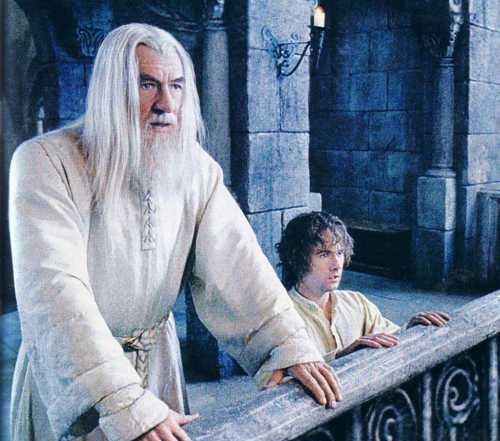The Two Towers by J.R.R Tolkien (Harper Collins 1991, 2007) pp. 726-729
This week we return from Théoden’s wonder at his first sight of Ents at Helm’s Deep to Merry and Pippin amidst the wreck of Isengard. Not that I think that they mind our neglect, as they are resting after their first good meal since they were captured by orcs over a week before. Treebeard had given them drafts of a drink that not only sustained them but even made them grow, but there is nothing like proper food and drink to achieve contentment and nothing like a hobbit to enjoy it properly.

Merry and Pippin sit on the edge of the ruin of Isengard and enjoy good food and their pipes.
“These hobbits will sit on the edge of ruin and discuss the pleasures of the table, or the small doings of their fathers, grandfathers, and great-grandfathers, and remoter cousins to the ninth degree, if you encourage them with undue patience.” So says Gandalf to Théoden after Merry has begun to discourse on the history of pipe-smoking in the Shire, and we know this to be true, not just because Gandalf says it but because we remember how Merry and Pippin sat down on the edge of Fangorn to eat a piece of lembas as Éomer’s company did battle with the orcs just a few yards away and how, when Aragorn, Legolas and Gimli found signs of this meal they commented that this was proof that hobbits had been there. Who else would choose such a spot for a meal?
Gandalf does not say it here but this is why he loves the Shire and his visited it so often over many years. There is a sense in which the whole Shire has been sitting on the edge of the ruin of Eriador as it has been since the fall of the Kingdom of Arnor and its successor, Arthedain, at the hands of the Witch-king of Angmar for many years and has quite simply ignored the fact, being entirely absorbed with its own affairs, the pleasures of the table and the small doings of its families. How different this has been from Gondor, for example, with its endless anxiety about the world beyond its borders, although perhaps in Lossarnach and in their lord, Forlong the Fat, there is something of a hobbit spirit.
Gandalf has needed the Shire for many reasons. In part he has needed it as a place of rest amidst his long and weary travels. But he has also needed it as a place of play, a place where he has learned to play. Sam Gamgee wanted Frodo to include a verse about Gandalf’s fireworks in the lament that he had composed about Gandalf in Lothlórien and that is what Gandalf had meant to him and to most of the people of the Shire. There is a sense that as Gandalf incarnated his Olorin spirit in Middle-earth as one of the Istari sent by the Valar to contend with Sauron, it was the Shire, and its “small doings” that shaped that incarnation in a very particular way. Saruman never understood this, laughed at it, and suspected it too. His own incarnation lay within the walls of what he thought was an impregnable fortress, a place where he could plot the conquest of Rohan and even dream of becoming the Lord of the Rings and master of Middle-earth.

Dimitry Burmak shows how Gandalf delights in his own fireworks at Bilbo’s farewell party.
That it was Gandalf who triumphed in the War of the Ring that ended the Third Age of Arda, and not Saruman, was in no small measure because of his love of the Shire. This was not just because, by a set of strange circumstances, the Ring came to the Shire, and then from the Shire to Mount Doom, but also because Merry and Pippin came to Fangorn Forest. It was Gandalf himself who told Frodo how he had chosen Bilbo for the Quest of the Lonely Mountain, a story recounted in Lost Tales, telling Thorin Oakenshield that “a foresight is on me.” This foresight, this world changing intuition, was formed within Gandalf’s soul by hours at hobbit tables on the edge of ruin while he smoked his pipe and listened to tales of the small doings of his hosts. It was from these doings that Sauron and Saruman fell.

The fall of Saruman in the Shire by Inger Edelfelt.



















